Good or bad, handsome or ugly, rich or poor….they are all equal now.
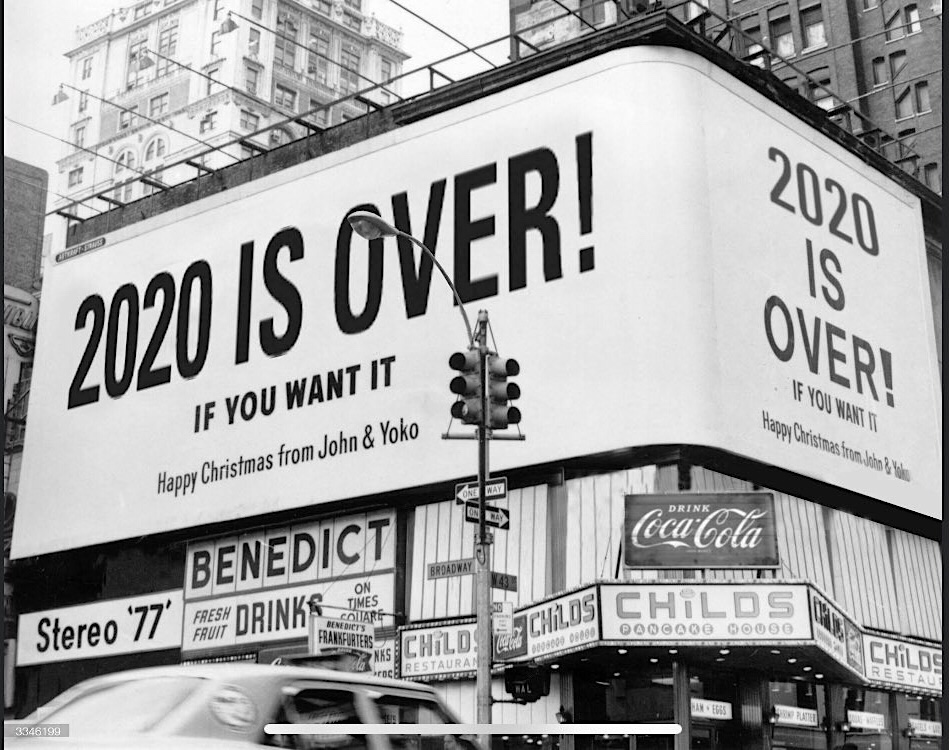
Good or bad, handsome or ugly, rich or poor….they are all equal now.

From Owen Gleiberman‘s recently posted Variety review of Mario Puzo’s The Godfather, Coda: The Death of Michael Corleone: “Here’s the news and the ever-so-slight scandal: It’s the same damn movie. I’m not exaggerating; it really is.
“The one impactful change is the new opening scene. The film now begins with the let’s-make-a-deal negotiation between Michael and Archbishop Gilday (Donal Donnelly), the weasel who heads the Vatican Bank, in which Michael agrees to pay the Vatican $600 million in exchange for the right to become the controlling shareholder of Immobiliare, an international real-estate consortium. Taking that scene, which previously came about half an hour in, and moving it to the front gives the film a kick-start, and it clarifies the underworld-meets-Catholic-Church corporate-business plot that didn’t actually need clarifying.
“Once that happens, the movie proceeds along in exactly the same way it did before, except that Coppola has made about five minutes’ worth of trims. [Plus there’s] a new ending, in which Michael is seated in that same chair in the sun [by his Italian villa], only now he doesn’t die.”
Two days ago legendary Los Angeles movie-beat TV guy David Sheehan passed from cancer at age 82. Regrets and condolences for this one-time critic, interviewer, producer, man about town. Not the hippest cineaste I’ve ever spoken to but sharp and personable enough. Sheehan was hot stuff from the early ’70s to early aughts on KCBS, KNBC and then back to CBS.
In the spring of ’85 I was working for partnered publicists Bobby Zarem and Dick Delson, and their star client at the time was Sylvester Stallone. Delson and I were with Stallone out at KNBC studios in Burbank for a Tonight Show with Johnny Carson appearance. Delson and I were waiting in a large adjacent hallway while Stallone was attending to business.
All of a sudden Sheehan showed up with a camera and sound guy, wanting to speak with Stallone. Delson hadn’t approved this — it was a totally unscheduled, total guerilla ambush on Sheehan’s part.
Did Delson go up to Sheehan and say, “Look, if you want to do an interview let me talk to Sly, and if he’s agreeable we’ll figure something out.” No, and the reason was unclear. Either Delson didn’t personally like Sheehan or was extremely angry about the ambush and determined to rebuff all advances, or had he figured Stallone might not be amenable and didn’t want to risk angering him?
So Delson stood in the hallway and glared at Sheehan and sulked, and Sheehan and his camera guy just waited patiently for Stallone to appear.
Stallone emerged 10 or 15 minutes later, Sheehan pounced, they did a five-minute quickie…over and out.
Sheehan was obviously playing a kind of hardball game with Delson. He was basically saying “look, Stallone will be here in a few minutes and I work in this building so why can’t I just talk to him right now? Why do I have to play by your chickenshit rules when I don’t have to?”
He was clearly showing more balls in this situation than Delson was. Delson was giving him a deathray look, but Sheehan just chilled and kept his cool and did his job.
From Richard Rushfield‘s Ankler newsletter — “Special Dispatch: Mad Max,” posted earlier today:
“Pump and Dump, I believe, is the term of art. AT&T would not be the first corporation to come to Hollywood and once the excitement of Oscar floor seats fades and the checks start coming due, their first thought is ‘Somebody get me the hell out of here!‘
“With all that as the backdrop, let’s first stipulate that I’ve frequently criticized the leaders of our little industry as too timid, conservative, reactive, and lacking guts and vision. Whatever else you can say about [Warner Bros.’ decision to offer all 2021 films simultaneously in theatres and HBO Max], timid and piecemeal it ain’t.
“A giant entertainment conglomerate is risking everything it’s got, betting the entire store on a new division — a floundering new division, no less. So whatever else we say about it, let’s bow to a rare show of moxie.
“This may turn out to be brilliant, or the greatest disaster in entertainment history, but at least it’s not ‘Are there any other Spider-Man supporting characters we can make a movie about?’
“Whatever else happens, you can’t say they didn’t try.”
For the good of enlightened 21st Century culture and the emotional safety of a certain subsection of Millennials and Zoomers, it is proposed that two lines of dialogue in Woody Allen‘s Everything You’ve Always Wanted To Know About Sex (specifically the “What Happens During Ejaculation?” sequence) be removed.
Both can be found in the top video. At 2:48 a sperm cell played by Allen asks “what if this is a homosexual experience?” This has to go along with the look on Allen’s face. At 3:59 an African-American sperm cell asks, “What am I doing here?” — obviously toxic racism and completely unacceptable.
“[A week after] I was asked to leave New York Magazine, they ran an 8,000-word piece I’d written, about plagues through history, so it wasn’t about the quality of my work. It was about their desire — not the editors, again, but other people — their desire to simply say, ‘I don’t want to be associated with this person, that he’s morally awful.’
“And you know, America is weird like this. There is a part of American history — Americans have tended to enforce orthodoxy through civil society, not through government. So this is the country that gave us the Salem witch trials, the country that gave us the Hollywood Blacklist, the country that gave us the Scarlett Letter, the country that gave us McCarthyism, and [now] the country that’s given us wokeness.
“These are attempts to enforce morality upon people in every part of their life…the language they use, the mannerisms they have, the places they work. This is the puritanical strain within American history, which is not equivalent in many other countries…this moralizing attempt to persuade and coerce to save your fellow citizens.
“If America were as bad as bad as the establishment left now believes, why would all these people want to come here? 86% of our immigration is non-white. What [form of] white supremacy invites 86% of its immigrants to be non-white? It’s completely bonkers.” — Andrew Sullivan speaking this morning to Megyn Kelly on her podcast.
The good stuff starts around 8:15.

#DisruptTexts is basically a movement by African American educators to challenge white narratives in standard-cirriculum literature for pre-college students. The idea is to introduce anti-racist perceptions and understandings.
If you wanted to be judgmental you could call #DisruptTexts a form of progressive revisionism or even a racially enlightened form of book burning. The other side of the coin is that we need to step outside of our white attitudes and take steps to redress our culture’s racist history. Or something like that.
I was struck this morning by the dismissive #DisruptTexts assessment of the beloved Atticus Finch, the small town widowed attorney, father of two children and moral hero of Harper Lee‘s “To Kill A Mockingbird,” which has been taught in schools for decades.
Last June a reader suggested to #DisruptTexts co-founder Lorena German that “we must show compassion to teachers and writers of the past [and not] judge them so harshly.”
Excerpt from German’s reply: “How about we spend some time finally showing compassion for the victims of racism and systemic oppression instead of the folks who perpetuated it? I don’t need to know someone’s heart, to know they were doing something wrong and inhumane. There were plenty of people at the time of Harper Lee writing books, essays, articles, and making speeches who were antiracist and already operating in a humane manner toward People of Color. Teachers and writers of that time could have shown empathy, the one you’re asking us to show, then toward those writers and thinkers. So, they’re not simply ‘teachers and writers of the past’ — they were participating in racism.”
Thoughts? And what would Gregory Peck say if he was around?

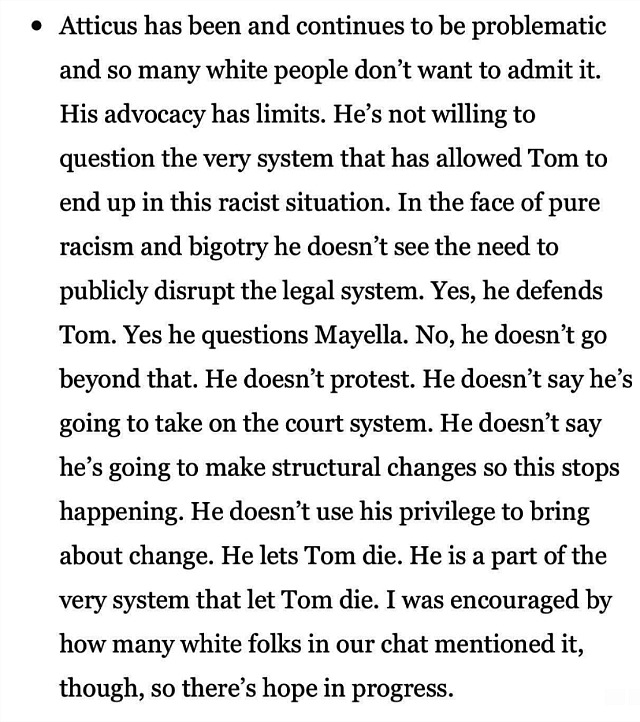
President-elect Joe Biden has announced he will ask Americans to wear masks for his first 100 days after he takes office. I’m guessing he’ll also be asking Americans to maintain social distancing, wash their hands frequently and generally play it safe as far as not spreading anything around. Whoa…radical!
I’ve been wearing a mask inside supermarkets and CVS stores, maintaining careful distances and washing my hands for nearly 11 months now. This is a big deal? To millions of morons living in certain portions of the U.S.A. and to young party animals who regard themselves as more or less immune, it is.
Bumblefucks have been behaving with such breathtaking stupidity for so many months, it’s staggering. Biden asking them to wear masks for 100 days is almost certainly going to be received as “the government is looking to take our freedom away!”
Biden to CNN’s Jake Tapper: “Just 100 days to mask. Not forever. 100 days. And I think we’ll see a significant reduction.”
“Biden said that where he has authority, such as in the realm of federal buildings or interstate transportation on airplanes and buses, he will issue a standing order that masks must be worn.”
Biden also said he’s asked Dr. Anthony Fauci to be a chief medical adviser and part of his Covid-19 response team when his administration begins next year.
It was announced earlier today that Warner Bros.’ entire 2021 slate will open day-and-date in theatres and HBO Max. Yeah, you heard me — Denis Villeneuve’s Dune, Baz Luhrman‘s Elvis, Lin-Manuel Miranda’s In the Heights, The Matrix 4, The Many Saints of Newark, The Suicide Squad, Sherlock Homes 3, Godzilla vs. Kong and Judas and the Black Messiah will debut on HBO Max and in theaters on the same date.
This is devastating news for exhibitors, of course, but welcome to the new, pandemic-ordered world and the dynamic onrush of streaming services, etc. HE will always choose theatres, if and when they ever open again.
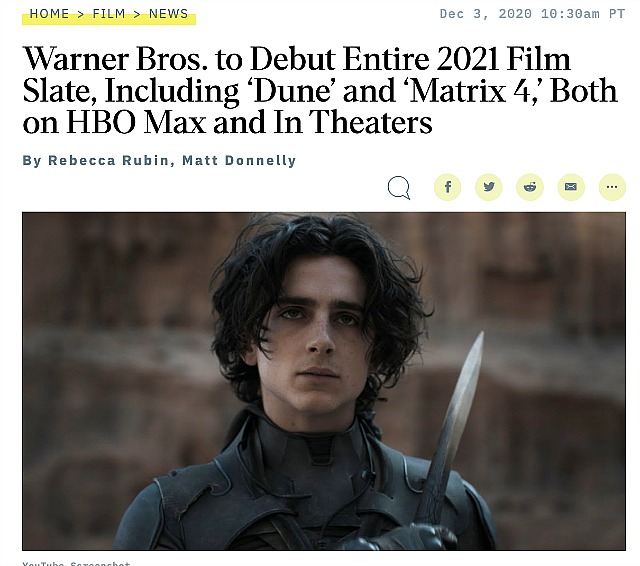
Just over 100 reputable critics have submitted their Best of 2020 lists to World of Reel‘s Jordan Ruimy. The topper, no surprise, is Chloe Zhao‘s Nomadland with 49 votes. Here’s the list along with some HE comments. My own personal preferences are after the jump:
1) Nomadland (49 votes) / HE: Yowsah.
2) First Cow (41) / HE: Good film but not this good…c’mon.
3) Never Rarely Sometimes Always (40) / HE: Somber, touching film about tural teens getting a NYC abortion, but doesn’t hold a candle to Four Months, Three Weeks, Two Days.
4) Da 5 Bloods (35) / HE: Deserving of respect but all that ’60s montage stuff was just thrown in to augment a so-so essence.
5) Minari (34) / HE: Good, earnest film.
6) I’m Thinking About Ending Things (32) / HE: Creepy but fascinating. Grows on you. The Oklahoma! stage performance sections + Agnes DeMille choreography.
7) Lovers Rock (29) / HE: Still haven’t seen it.
8) The Invisible Man (26) / / HE: Ranked higher than Tenet? Ludicrous.
9) Trial of the Chicago 7 (25) / HE: Yup.
10) Mank (21) / HE: Deserves higher placement.
11) Bacurau (21) / HE: Brazilian social-clash Peckinpah-Jodorowsky…hated it.
12) David Byrne’s American Utopia (21) / HE: Haven’t seen it.
13) Palm Springs (20) / HE: No way. Ridiculous. Mostly hated it. Sundancey.
14) Tenet (19) / HE: Should be among the top ten.
15) Dick Johnson Is Dead (19) / HE: Still haven’t seen it.
16) Bad Education (18) / HE: Agreed…a sharply observed docudrama.
17) Time (17)
18) The Assistant (17) / HE: Nope.
19) Vitalina Varela (16)
20) Pixar’s Soul (15) / HE: Bothersome, underwhelming, doesn’t make sense.
Everyone understands that dual pronoun use is currently in fashion among certain non-binary persons to express the complexities of their gender identity in different contexts and social settings…right?
I just want to apologize in advance to the gender-fluid, vague-pronoun crowd that I am, always have been and always will be a “he”, as in dude, guy, male-ish, rumblehog rider, baseball mitt owner, etc.
Although I’ve identified as metrosexual for years and have long abhorred certain aspects of macho posturing, I will never be a “he/she/whatever” and I’m definitely not a “they.”
I can’t be a “they” because I’m just, you know, a single person with a single past. Am I missing something? Do I need to shoot myself with a Sig Sauer? Or should I split my head open with a sharp axe?
My name is Jeff, I live in West Hollywood, and I only use “he/him” pronouns. I know that’s kind of an uncool or anti-social thing these days, but I’m obstinate, I guess.
Speaker #1: “Hey, where’d they go?” Speaker #2: “Who?” Speaker #1: “They were just here a few minutes ago.” Speaker #2: “Jeff was just here. He’s down at Kinkos picking up an order.” Speaker #1: “They’re at Kinkos?” Speaker #2: “No, he is…Jeff is.” Speaker #1: “I’m just trying to use cautious terminology. You don’t have to be disrespectful about it.” Speaker #2: “Who’s being disrespectful? I’m just saying plain and straight like Walter Brennan on horseback might say in a John Ford western, ‘He’s down at Kinkos’…period.”
The daughter of an occasional friend (i.e., one who sometimes ignores me but not always) recently insisted upon dual pronouns when they spoke about a female friend she was planning to meet in another city. “And so we had to navigate these awkward conversations,” the friend reports. “’How are they?’ ‘Oh, they’re fine.’ ‘I’m going to be seeing them later.’ If I were to point out how utterly bizarre this is [my daughter] would get angry.”
“What it actually satisfies is a need to be something other than Cis,” she interpreted. Cis is bad — cis is asshole males, must to avoid. Plus, she said, “It’s a way of getting attention from peers. Simplistic, yes. A few writers believe it is a kind of contagious hysteria, like anorexia.”
Actual friendo reply: “I still don’t get how an individual person can be a ‘they.’ Doesn’t that, like, break the basic rules of grammar? I mean, I don’t even get what it means.
“I know they mean well and I know this is what people want to hear about and I know it’s meant to be progress, but I just feel exhausted. She/Her/Hers. Does it have to be both Her and Hers? Aren’t they the same thing?”
Let Them All Talk (HBO Max, 12.10) is a smart, reasonably engrossing, better-than-mezzo-mezzo character study that largely takes place aboard the Queen Mary 2 during an Atlantic crossing.
It’s primarily about Alice, a moderately famous, sternly self-regarding novelist (Meryl Streep) and her somewhat brittle relationship with two old college friends, Susan and Roberta (Dianne Wiest, Candice Bergen), whom she’s invited along on a New York-to-Southhampton voyage, courtesy of her publisher.
Also tagging along are Tyler (Lucas Hedges), Alice’s 20something nephew, and Karen (Gemma Chan), an anxious book editor whom Tyler takes an unfortunate shine to.
Also aboard is a David Baldacci-like airport novelist (Dan Algrant) whose books Roberta and Susan adore, and who’s far more engaging and emotionally secure than Alice any day of the week.
Working from a script by Deborah Eisenberg and literally shot during a seven-day crossing in 2019, Let Them All Talk features Soderbergh in standard three-hat mode — director, cinematographer (as Peter Andrews) and editor. All I can say without spoiling is that he manages to keep things sharp, interesting and slicey-dicey for the most part. Streep is playing an aloof, mostly unlikable character, Hedges a somewhat gullible one, and Algrant the most amiable.
But Bergen’s Roberta, who’s fallen upon difficult economic times due to a divorce, is the most interesting character by far. It affords Bergen an opportunity to give her best performance in I don’t know how many years. Since Gandhi or even Carnal Knowledge?
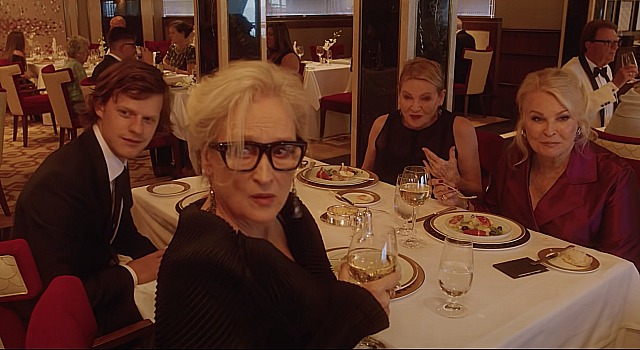
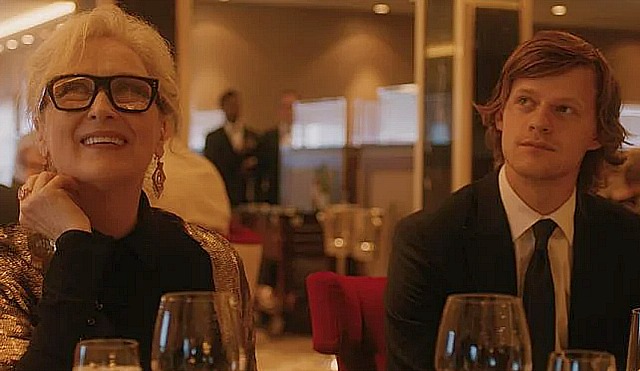
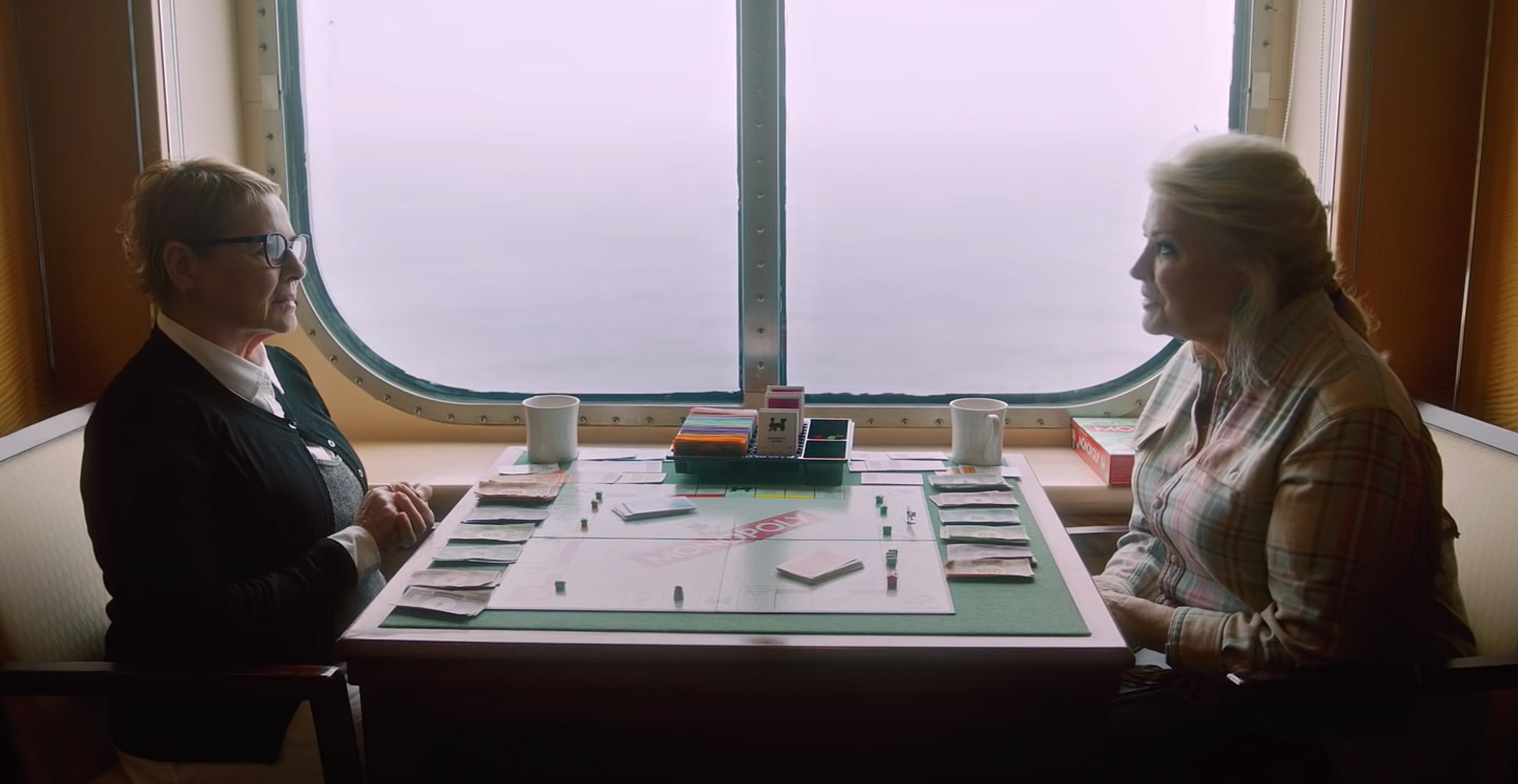
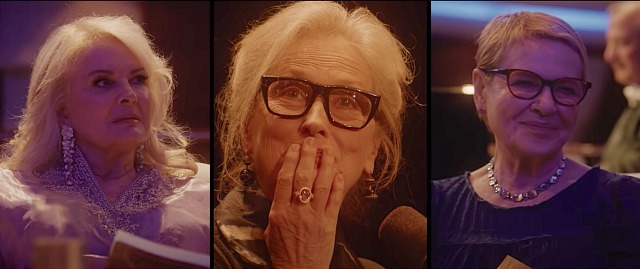
Roberta is a frustrated boomer-aged woman who works in lingerie retail and who wants more money in her life. Alas, she hasn’t any economic opportunities to speak of and hasn’t a prayer of landing a rich boyfriend or husband because she’s “old meat” (all the eligible 60something guys, it seems, have 20something girlfriends) and far from svelte. And yet she’s on her game at all times, attuned and thinking and assessing. Plus she has a testy, unresolved relationship with Alice, who years ago used Rebecca’s ruptured marriage as raw material for her biggest-selling book, “You Always/You Never.”
And then her big opportunity comes when something happens that I can’t disclose, and Roberta…let’s just say her life takes a potential turn for the better.
I’m presuming that Let Them All Talk is regarded as a theatrical feature that had to accept an HBO Max debut because of the pandemic, and therefore Oscar-qualifying. If so, Bergen is definitely a Best Supporting Actress nominee waiting to happen. I just wish she’d somehow held onto her Murphy Brown-ish appearance. I only know that when she turned up in Warren Beatty‘s Rules Don’t Apply, my first reaction was “wait…who’s that? I know her but I can’t place her.”
I really liked Algrant’s novelist. A very sharp, no bullshit, calmly transactional character. Savvy, frank, classy. Somewhat resentful, Alice looks down her nose at him but he’s a pro with a good gig and no pretensions.
Question: If a book isn’t working out, what kind of writer would wipe it off his/her hard drive and throw away a printed manuscript? Writers don’t do that. They hold onto the material and use it for something else down the road. Sometimes you can find a new way in…nobody throws half-written books away.
Chan has a good scene in which she tells the story of her long engagement suddenly falling apart. And another when Tyler (Hedges) places his emotional cards face up on the table.
Honestly: How could this highly intelligent 20something even fantasize that Chan would be interested in him romantically? He’s supposed to be, what, 24 or 25? And he thinks that a 30something editor whose job is on the line, who’s trying to keep tabs on Alice…he thinks that this woman might be interested in a little trans-Atlantic boning?